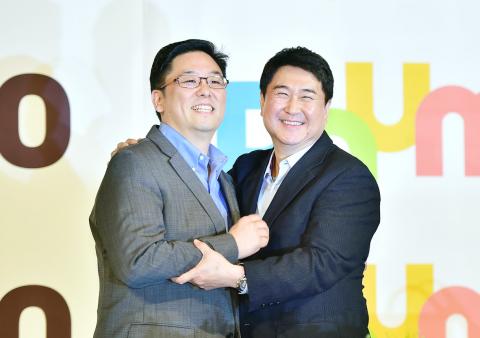South Korea’s top messaging service provider, Kakao Corp, and its second-largest Internet portal, Daum.net, yesterday announced a merger to create a one of South Korea’s largest IT companies — worth about US$3 billion.
Daum Communications Corp, the operator of portal Daum.net, said the merger with Kakao, which runs the hugely popular mobile chat app Kakao Talk, would be completed in October through share swaps.
The move was aimed at “enhancing core businesses and creating business synergy,” Daum said in a regulatory filing.

Photo: AFP
It said the swap ratio had been set at one Daum share for 1.55 Kakao shares.
The newly merged company — named Daum Kakao — will benefit from Kakao’s popularity on mobile platforms as well as Daum’s business clout and experience with Internet searches and ad sales, the two firms said in a joint statement.
The merger “will put us in a strong position to respond to fast-changing global market,” Kakao chief executive Lee Seok-woo said in the statement.
Kakao Talk is used by more than 140 million people globally, including about 35 million South Koreans — more than 90 percent of the country’s smartphone users.
“We thought organic growth took too long at a time when our overseas competitors overseas were expanding businesses rapidly,” Lee said.
“So we reached the decision [to merge] to offer our customers upgraded services at a faster speed,” he added.
He did not elaborate on Daum Kakao’s future business plans.
The merged company is to be better positioned to compete with South Korea’s dominant Internet portal, Naver, which operates Line, a messaging service and rival to Kakao Talk that is popular in Japan and Southeast Asia.
Naver’s share price closed down 4 percent yesterday on the news.
The new firm still faces a daunting task to compete globally against bigger rivals like China’s WeChat, which has more than 600 million users, and WhatsApp, acquired by Facebook Inc for US$19 billion earlier this year.
Founded in 2007, Kakao has not gone public yet, but its shares are traded over the counter in Seoul and it has an estimated market value of 2 trillion won (US$1.9 billion).
Company founder Kim Beom-soo has a leading 30 percent stake in Kakao and a venture company Kim owns also has 23.7 percent shares. Chinese Internet giant Tencent Holdings Ltd (騰訊) also has a 13.3 percent stake.
The Shenzhen-based company approved the merger, Lee said, adding that Daum Kakao had no immediate plan to expand business in China.
Daum — founded in 1995 — has about 30 million users and is valued at about 1 trillion won on Seoul’s tech-heavy KOSDAQ board. The latest deal will make Kim the leading shareholder of the new firm, with a personal stake of 22.23 percent, and allow a backdoor listing of Kakao shares on the KOSDAQ.
“Daum can secure a new source of growth via Kakao’s [mobile] platform, and Kakao can use Daum’s vast business resources to explore new businesses and overseas markets,” Hana Daetoo Securities analyst Hwang Seung-taek said.
South Korea is one of the world’s most wired countries, with 37 million owning a smartphone out of a population of 50 million.

BYPASSING CHINA TARIFFS: In the first five months of this year, Foxconn sent US$4.4bn of iPhones to the US from India, compared with US$3.7bn in the whole of last year Nearly all the iPhones exported by Foxconn Technology Group (富士康科技集團) from India went to the US between March and last month, customs data showed, far above last year’s average of 50 percent and a clear sign of Apple Inc’s efforts to bypass high US tariffs imposed on China. The numbers, being reported by Reuters for the first time, show that Apple has realigned its India exports to almost exclusively serve the US market, when previously the devices were more widely distributed to nations including the Netherlands and the Czech Republic. During March to last month, Foxconn, known as Hon Hai Precision Industry

Taiwan Semiconductor Manufacturing Co (TSMC, 台積電) and the University of Tokyo (UTokyo) yesterday announced the launch of the TSMC-UTokyo Lab to promote advanced semiconductor research, education and talent development. The lab is TSMC’s first laboratory collaboration with a university outside Taiwan, the company said in a statement. The lab would leverage “the extensive knowledge, experience, and creativity” of both institutions, the company said. It is located in the Asano Section of UTokyo’s Hongo, Tokyo, campus and would be managed by UTokyo faculty, guided by directors from UTokyo and TSMC, the company said. TSMC began working with UTokyo in 2019, resulting in 21 research projects,

Ashton Hall’s morning routine involves dunking his head in iced Saratoga Spring Water. For the company that sells the bottled water — Hall’s brand of choice for drinking, brushing his teeth and submerging himself — that is fantastic news. “We’re so thankful to this incredible fitness influencer called Ashton Hall,” Saratoga owner Primo Brands Corp’s CEO Robbert Rietbroek said on an earnings call after Hall’s morning routine video went viral. “He really helped put our brand on the map.” Primo Brands, which was not affiliated with Hall when he made his video, is among the increasing number of companies benefiting from influencer

Quanta Computer Inc (廣達) chairman Barry Lam (林百里) yesterday expressed a downbeat view about the prospects of humanoid robots, given high manufacturing costs and a lack of target customers. Despite rising demand and high expectations for humanoid robots, high research-and-development costs and uncertain profitability remain major concerns, Lam told reporters following the company’s annual shareholders’ meeting in Taoyuan. “Since it seems a bit unworthy to use such high-cost robots to do household chores, I believe robots designed for specific purposes would be more valuable and present a better business opportunity,” Lam said Instead of investing in humanoid robots, Quanta has opted to invest